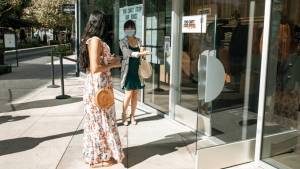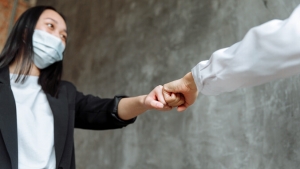People often experience some level of anxiety in the face of challenges and unfamiliar situations. The COVID-19 pandemic was both challenging and unfamiliar on many levels and has caused uncertainty about the future. According to University of Hawaiʻi at Mānoa Counseling and Student Development Center (CSDC) psychologists, this can be a perfect recipe for generating (or exacerbating) anxiety, and now things are changing again as the world begins to reopen.
“If you are experiencing some discomfort with the idea of things ‘returning to normal,’ you are not alone,” said CSDC Psychologist Alexander Khaddouma. “In fact, around half of people report feeling uneasy about readjusting to in-person activities post-pandemic. It’s important to give yourself some room to feel these uncomfortable feelings and accept that they are sometimes a normal response to an abnormal situation.”

It’s OK to start small
Find incremental ways of phasing back into interactions with others; start by having brief, socially-distanced interactions with someone you trust before attempting larger social events, such as parties, concerts or gatherings. Often with anxiety, the more you “practice” a particular skill like socializing, the more comfortable you will become and the less anxiety you will experience in the future.
Prioritize activities that reduce anxiety
Restrictions during the pandemic may have contributed to developing unhealthy habits. Activities like exercise, maintaining a balanced diet, and getting enough sleep are imperative for rebuilding resilience and self-care. Consider retaining positive habits you may have developed during the pandemic; such as a new hobby, virtual check-ins with loved ones who live at a distance or taking more regular walks.

Communication is key
Experts suggest being honest about concerns with everything from shaking hands, hugging, to engaging in small talk in public spaces. Seeking guidance from trusted sources of support can help lower anxiety by providing clarity about how to address new situations. You may also find it helpful to know that others likely feel the same way, making the “new normal” feel a little less scary.
Seek help when needed
If you find that your mental health is getting in the way of living the life you want, accomplishing goals, or doing things that make you happy, seek professional help.
- Related UH News story: Free program trains faculty, peers to aid anxious, depressed students, March 30, 2021
CSDC offers free mental health resources for UH Mānoa students. Interested students should call (808) 956-7927.
For faculty, staff and academic programs, CSDC offers training opportunities, as well as clinical and program consultation regarding student mental health. UH Mānoa faculty and staff are encouraged to contact CSDC about how to refer students to appropriate resources, or to arrange topical training for their departments.
Faculty and staff seeking counseling services can contact the UH Employee Assistance Program for available resources through Worklife Hawaiʻi.
This effort is an example of UH Mānoa’s goal of Enhancing Student Success (PDF), one of four goals identified in the 2015–25 Strategic Plan (PDF), updated in December 2020.

